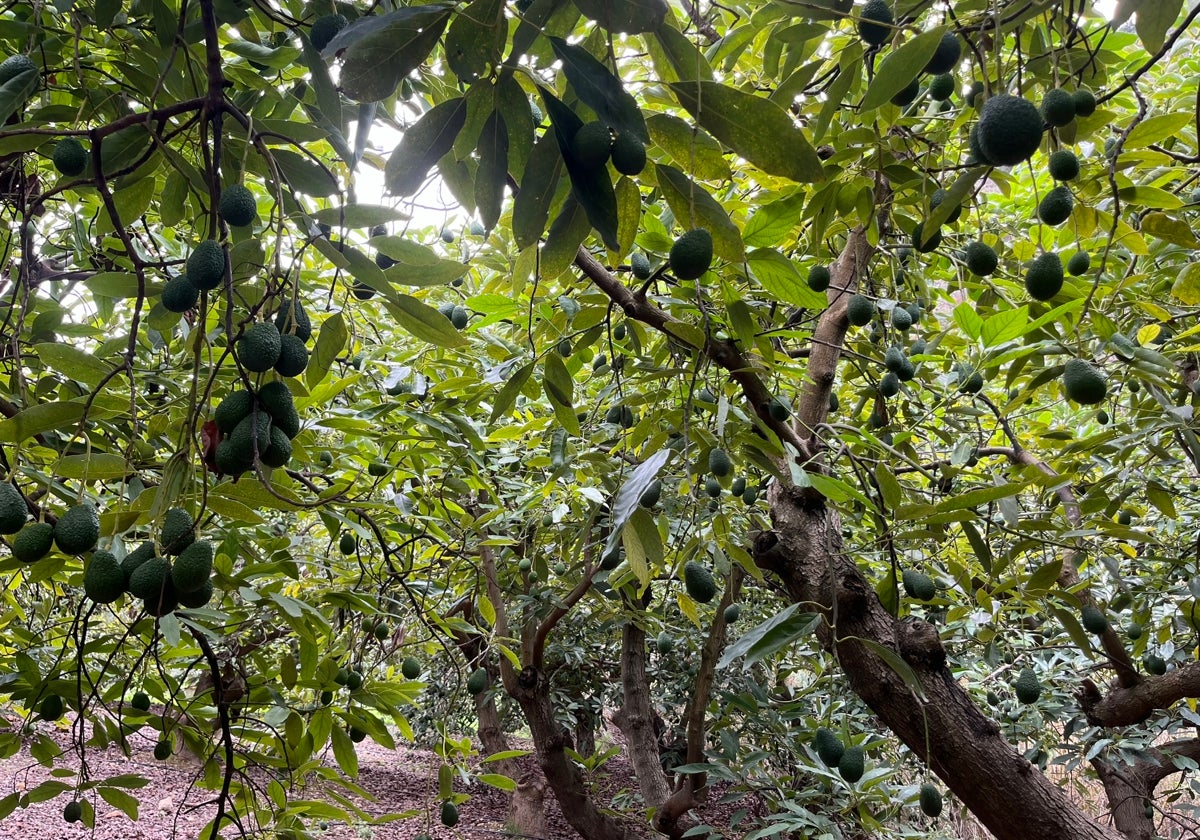Area to east of Malaga seeks to promote more sustainable farming practices
Researchers from the University of Cordoba are analysing the "barriers" that limit adaptation to sustainable techniques for tropical and greenhouse crops in the Axarquía
The abundant rainfall so far this year has put an end to almost five years of extreme drought in Malaga province, which has had a particular impact on the Axarquía. Hundreds of hectares of subtropical crops, especially avocados and, to a lesser extent, mangoes, have been badly affected. Many farmers are looking at ways to renew their plantations now that the rains have returned and the outlook is once again promising for the sector.
The use of recycled water from waste water treatment plants in the province has compensated for the drastic reduction in water resources from La Viñuela reservoir, which farmers were not able to access from 1 October 2022 until summer 2024, when limited quantities were granted for emergency irrigation. This year the situation is completely different and 12.8 million cubic metres have been planned for land which forms part of the Guaro Plan, which means some 2,000 cubic metres per hectare.
Now a team from the University of Cordoba (UCO) is researching alternatives to the conventional agricultural business model to integrate sustainable practices, including crop rotations, cover crops and avoiding the use of chemical fertilisers in Mediterranean farms, as well as determining the barriers that limit the application of these practices as part of the European AgrEcoMed project.
Researchers Laura Sánchez Mata, Melania Salazar Ordóñez, Macario Rodríguez Entrena and Julio Berbel, from the WEARE-EAARN (Water, Environmental and Agricultural Resources Economics) research group at the UCO, are working on this project and are studying horticultural, subtropical and olive crops in the Axarquía.
The project focuses on assessing the economic sustainability of the transition to more sustainable practices. The researchers have analysed the current business models for these farms, their current level of sustainability, and the barriers that limit this transition, to come up with "a business model that is as profitable and efficient as possible" according to the university.
The researchers say that "Europe needs to improve the sustainability of its agri-food chain". For this reason, since 2020 the EU has been promoting strategies to encourage the transition of the sector to a more sustainable model, such as the European Green Deal's Farm to Fork strategy.
Sustainable farming practices offer the possibility of progressively redesigning the agroecosystem and reconnecting it with local consumers to make this transition. According to scientists, they "prevent erosion, improve biodiversity, reduce deforestation and increase the capacity of soils to capture carbon". They add, "The main limitation of organic farming is the production yield, which is lower than in conventional farming. The programme offers the possibility of applying sustainable practices with different levels of demand which, with the right business model, can continue to be profitable in the long term," said the researchers.
Agriculture in general is vulnerable to droughts or torrential rains, which are increasing due to climate change. In addition, conventional farms often focus on a single type of crop, which leaves little room for manoeuvre in crisis situations. Sustainable farming models can be more resistant to this type of crisis. Mulching, for example, protects the soil from erosion and reduces the impact of drought. In addition, they often combine different sources of income and crops, which can make them more resilient.
Long-term productivity
"The use of chemicals or bad practices contribute to erosion," says Laura Sánchez, adding, "Taking care of your farm today guarantees its productivity in the long term." Given that one of the main concerns of farmers is the volatility of the market, which causes the prices of inputs such as manure or fertilisers to vary, if livestock manure is recycled as fertiliser for the crop (circular economy) or the use of chemical fertilisers is avoided (organic farming), this problem is reduced, according to the specialists. Moreover, diversifying cultivation, one of the keys to agroecological production, makes it easier to adapt to crises and market fluctuations.
Crop rotation, deficit irrigation, cover crops and mulching help to increase biodiversity, save water and prevent erosion. Another strategy to improve farm profitability is to combine farming with other activities, ranging from agro-tourism to on-farm processing of agricultural products, in order to have different sources of income. For these researchers, it could also be useful to diversify sales channels or make direct sales to reduce costs and pollution.
However, the biggest limitation of this type of practice seems to be getting started. The transition is often difficult without specialised training, and adapting machinery can be costly. "If their only economic activity is agriculture they place much more value on production and the economic performance of the farm," Sánchez explains. In these cases, the solution could involve financial aid to farms to cover the initial cost.
Mango malformation control
Mango production in Spain, particularly in regions like Andalucía, has increased in recent years as a significant agricultural activity thanks to the subtropical climate that offers ideal conditions for its cultivation. However, one of the main challenges faced by farmers is mango malformation, a condition that negatively impacts both crop quality and yield. A recent article published in the journal Phytoma addresses this problem to understand its origin, economic implications and strategies to mitigate it.
According to the researchers, the mango is one of the most cultivated and commercialised subtropical fruits in the world. The province of Malaga, and in particular the Axarquía area, is the largest mango production centre in Europe, along with Granada. This success is backed by favourable agro-climatic conditions, such as warm temperatures, well-drained soils and a suitable altitude. However, mango cultivation in the Axarquía faces serious limitations due to water restrictions for irrigation, as well as the presence of pests and diseases.

